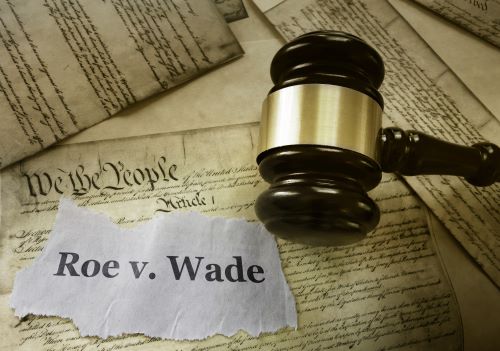Supreme Court overrules Roe v. Wade and the right to abortion

Image from Shutterstock.
The U.S. Supreme Court ruled Friday that there is no constitutional right to abortion in an opinion by Justice Samuel Alito—the same justice who wrote the opinion when it was leaked in draft form.
The high court overruled the abortion-rights opinions Roe v. Wade and Planned Parenthood v. Casey.
“The Constitution makes no reference to abortion, and no such right is implicitly protected by any constitutional provision, including the one on which the defenders of Roe and Casey now chiefly rely—the due process clause of the 14th Amendment,” Alito said.
Roe, decided on a 7-2 vote in 1973, held that states can’t ban abortions before viability, the point at which a fetus can survive outside the womb.
In 1992, the Supreme Court reaffirmed that states can’t prohibit abortions before viability in Casey. But the court said abortions could be regulated before viability if the restrictions didn’t place an undue burden on access to abortions.
Alito’s new opinion overturning both decisions was joined by all the court’s conservative justices—with the exception of Chief Justice John Roberts.
Concurring in the judgment, Roberts said he would have taken “a more measured course” and discarded the viability standard in Roe.
“Our abortion precedents describe the right at issue as a woman’s right to choose to terminate her pregnancy. That right should therefore extend far enough to ensure a reasonable opportunity to choose but need not extend any further—certainly not all the way to viability,” he wrote.
The Supreme Court ruled in Dobbs v. Jackson Women’s Health Organization, a challenge to Mississippi’s ban on most abortions after 15 weeks of pregnancy. The ban did not apply in the case of a medical emergency or a severe fetal abnormality.
The decision comes after Politico published a leaked draft opinion by Alito on May 2 that also overturned Roe. The opinion led to protests and an attempted murder charge against a California man who allegedly told police that he feared potential court rulings so much that he planned to kill Justice Brett Kavanaugh. The man, 26-year-old Nicholas John Roske, was later indicted on a federal charge of attempting to kill a Supreme Court justice, the U.S. Department of Justice announced June 15.
The 98-page draft opinion by Alito appeared to have been circulated to the court Feb. 10. He wrote then that the Constitution does not make any reference to abortion, and no constitutional provision protects the right to obtain one. Roe “was egregiously wrong from the start,” he wrote in the draft opinion.
The same sentence is in the opinion released Friday.
Justice Clarence Thomas had joined Alito’s opinion, but he wrote a concurrence “to emphasize a second, more fundamental reason why there is no abortion guarantee lurking in the due process clause”—there is no basis in the Constitution for the concept of substantive due process.
Thomas called on the court to reconsider all the court’s substantive due process precedents, including Griswold v. Connecticut (the right to contraception in marriage), Lawrence v. Texas (the right to engage in consensual sex) and Obergefell v. Hodges (the right to same-sex marriage).
In another concurrence, Justice Brett Kavanaugh wrote that overruling Roe “does not threaten or cast doubt” on Griswold, Obergefell and precedents establishing the right to interracial marriage and contraceptive use by unmarried people.
Alito also emphasized Kavanaugh’s point in his majority opinion.
“Our decision concerns the constitutional right to abortion and no other right,” he wrote. “Nothing in this opinion should be understood to cast doubt on precedents that do not concern abortion.”
Justices Stephen Breyer, Sonia Sotomayor and Elena Kagan dissented in an opinion listing them all as authors. They warned of “draconian restrictions” that will be enacted by states to impose their moral choices and “coerce” women to give birth.
“One result of today’s decision is certain: the curtailment of women’s rights and of their status as free and equal citizens,” the dissent said.
The ABA had filed an amicus brief urging the justices to uphold Roe. Overturning the decision “would be a devastating repudiation of stare decisis, jeopardize the public’s faith in our legal institutions, and have a cruel effect on the lives and expectations of millions of women,” the ABA brief said.
ABA President Reginald Turner issued a statement Friday emphasizing that the association “remains committed to doing all it can to support reproductive choice.”
Hat tip to SCOTUSblog, which had early coverage of the decision.
See also:
ABAJournal.com: “Is Alito right about the ‘unbroken tradition of prohibiting abortion’? Scholars disagree on the history”
ABAJournal.com: “What does the original Roe v. Wade really say?”
ABAJournal.com: “Chemerinsky: Precedent seems to matter little in the Roberts Court”
ABAJournal.com: “Roberts’ reference to memos of Blackmun on Roe v. Wade raises questions about SCOTUS justices’ private papers”
ABAJournal.com: “Abortion opponents cite Justice Ginsburg in arguments to overturn Roe v. Wade”



